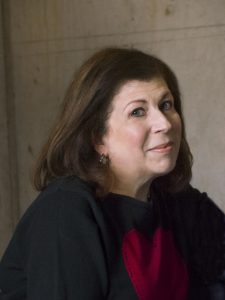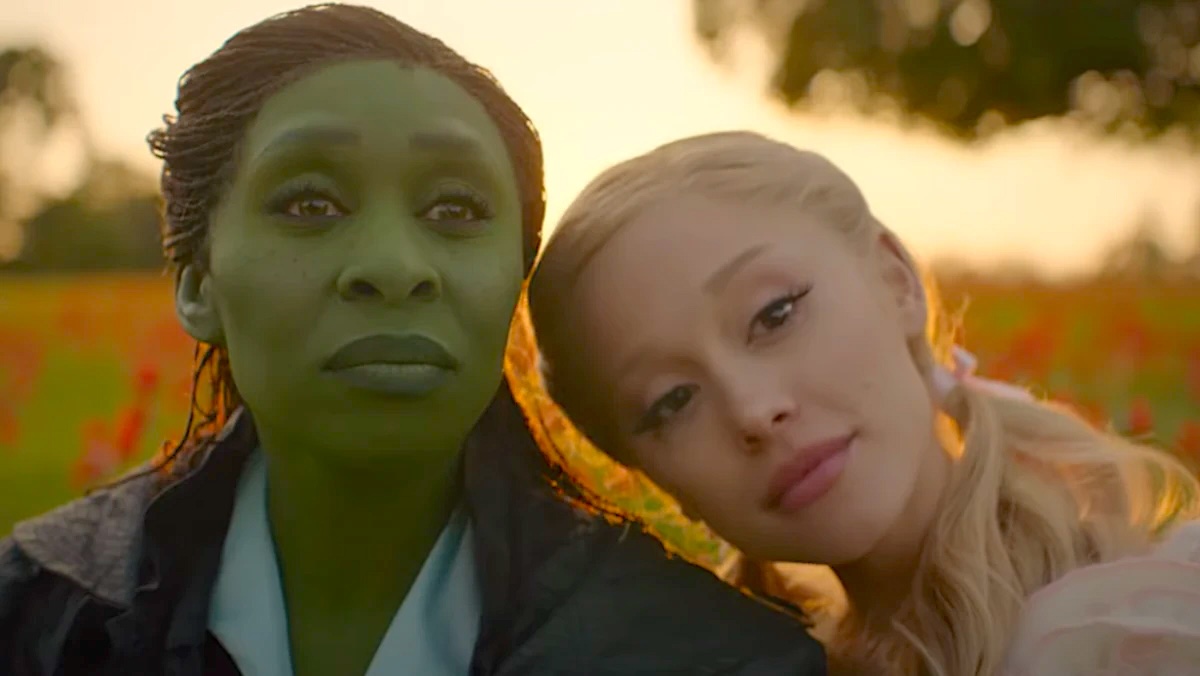The story of Oz and its eclectic group of characters has a legacy of nearly 125 years. Each iteration, be it L. Frank Baum’s original book and the classic 1939 movie or the Broadway musical and Gregory Maguire’s 1995 novel on which it was based, has held different meanings for different people across generations. Who doesn’t remember the first time they felt the bittersweet emotion of Somewhere Over the Rainbow or the exhilaration of Defying Gravity?
The job of finally bringing Wicked to the big screen was not taken lightly by writers Winnie Holzman and Dana Fox. Holzman, who wrote the musical stage production along with Stephen Schwartz, has a bond with the characters that dates back nearly 30 years, and both she and Fox felt an incredible sense of passion and responsibility for this project. The film’s enormous success proves that the legacy behind it has now carried over to a new generation.
Wicked tells the backstories of G(a)linda (the Good Witch) and Elphaba (the Wicked Witch of the West) and the rivalry/friendship they initially shared. What is it about these characters that resonates with so many viewers? Holzman describes the story at its core, “Two people meet and they’re going to change each other’s lives forever. Some part of them sees that and they are rattled to their core. Who hasn’t had that feeling? But I think it’s about the intensity and the fearfulness of being in a relationship that is going to change who you are. And change you into the person that you were always meant to be.”
I spoke with Holzman and Fox about the writing of Wicked, the decision to split it into two parts (Wicked Part 2 will be released towards the end of 2025), the story’s enduring relevance and the opportunities that expanded timeframe offered.
Tell me about revisiting the original Wizard of Oz story and film, Gregory Maguire’s 1995 book, and the play in order to write this script.
Holzman: There’s such a legacy here. This is something that I don’t always talk about because I don’t always feel like I have the time… but it goes all the way back to the beginning of the previous century and this man named L. Frank Baum, who happened to be living with a feminist. Baum’s wife and mother-in-law were committed feminists. He wrote this incredible story about a little girl who goes to a mythical land, and in that land, there’s all this symbolism about empowered women and corrupt male power. This story captured people’s hearts and was made into a beloved movie, one of the beautiful American works of art.

Winnie Holzman
So we’re a small part of a very rich legacy. Gregory Maguire took the story and made it into his own political statement. Marc Platt was going to make it into a non-musical movie, which is understandable as it has all of these iconic American characters. But Stephen Schwartz had the foresight and insight to say, “Don’t make it into a movie. Let me turn it into a Broadway musical.” It was a big leap for Universal, but Stephen was very convincing, and I think Marc had always wanted to produce a musical. So I was brought in and we did the musical – with this real understanding that if it were successful, it would eventually be turned into a movie.
When Dana was brought in by (director) Jon Chu and Marc Platt, we were already trying to figure out how to make our musical into a movie – a movie that we didn’t want to make just for the sake of making one. We wanted to give the audience a new experience. The idea of making it into two movies had been floated, and I’d been talking about it with Stephen and Marc for a long time… but I think it was Jon who was the first to understand how it could work. The whole idea behind having two movies is to really explore the story. And that’s when Dana came in with a new voice and a new point of view.
Fox: At that point, there was an intrinsic time pressure that we all felt underneath everything. But at the same time, there was this legacy that Winnie spoke of that I was so generously invited into. So we also felt a profound sense of responsibility to do right by that legacy, to feel like we could come in with something as important as what had come before us.
There was an additional layer – which Winnie has known for 28+ years – of fans who really feel like the play is their own. They’re so attached to it. We had months of conversations about how to break up the story into two separate parts, and how it was going to differ from the play, while feeling an enormous responsibility to satisfy the original fans. How do we not take anything away from how they felt when they originally saw the play – probably at a completely different age – and honor all the feelings they have about it?
At the same time, we knew it had to stand alone as one movie and that the second part has to stand alone as its own movie. There were a lot of interesting pressures we were faced with and we were really excited – but it was nice to have another writer to tag in as it was a ton of work.
Holzman: It was exciting because we were going to create something new but still hold to the spirit of our musical production. How to find that delicate balance was always uppermost in our mind and we laboriously explored every beat of the show. That exploration enlivened things, it revealed more about the characters. When people ask, “What did you change?” I say, “We changed every beat of the show.” Everything is new, newly rethought and revealed in a new way… and yet it still stays true.
What freedoms did the expanded timeframe of two movies give you in terms of story and character development?
Holzman: Making it into two movies gave us the freedom to add the things we felt would give more of a cinematic experience to audiences. And give them more of an in-depth and detailed understanding.
For example, Elphaba’s birth scene is much more elongated in the film. Dana and Jon had new ideas of what could happen during that scene – it’s one we have in the play, but it’s so different onscreen. That’s just one tiny example and the decision to have two movies gave us the ability to have some of those things that we otherwise could never have had.
Fox: We approached it knowing that some of the elements in the play are a bit sacred. Every moment in the play is somebody’s favorite moment of all. So we tried to be cognizant of that and look at those moments and say, “How can we make them feel incredibly cinematic but not change their DNA?” We tried to find little places where we could go and explore the world or a character’s feelings or be alone with someone who we couldn’t be alone with otherwise in the play… chip away at those places and deepen them. The reason to make a movie is to blow the doors off and do all the things that you can’t do in a play. So that hopefully it would enrich it for people but not change the fundamental experience of what they loved.
Holzman: Enrich is a beautiful word. Remember, these were very deep conversations that lasted for days and weeks, with regard to every aspect of the plot. We found the version of it that we felt was the most meaningful.
There’s a scene where Elphaba walks into the dorm room and encounters Galinda – that’s a scene that doesn’t appear in the play but it sets up their song with more depth.
Fox: That touches on something really important – we knew that the songs were incredibly important stakes in the ground throughout the whole movie. Something I’ll never forget was being able to interrogate Winnie and Stephen about these characters and their songs – they knew more about them than anybody on the planet. There were these moments in the songs where we would all get chills from the words. We would get to those moments and then we’d say, “Did we see enough of that in the movie? Did the movie bolster that feeling in that moment when that line comes and we feel it in our body?” That was another way we built things that were new – we knew the moments that would hit people as hard as they did. And then we went back and made sure that there were elements that led up to those moments. It was about having the ability to go into something that already was amazing and worked well and then support all of its best moments.
In a recent interview, Gregory Maguire speaks of his book as a tragedy and the play as a bittersweet drama. He says it’s a shift in tone, but retains the same messages. What tone did you want to strike with the film and how does it complement the other iterations of the story?
Holzman: Going to the very beginning of it all, Stephen and I were very blessed to have Gregory’s permission to take the book and adapt it into the play. We did not want to replicate the tone of the book, as brilliant and prophetic as it is. It has such an amazing premise.
But we did not see the plot of the book per se as our musical. It’s infused with our own personalities and how we see the world. Still, we always wanted to remain true to Gregory’s idea that there was something about a place like Oz, where you could either look on the surface or you could look deeper. And when you looked deeper, you could see that there were things that were not right – things that were unjust and truly wicked.
How do you handle that? When do you step up? Do you say something? All of those questions that are in Gregory’s book are in our show. They’re just presented in another tone, as you said. It’s a perfect word. I think with the movie, again, it still had to be its own thing. But it has to do with what Dana was saying about deepening everything, about making sure that everything was expressed in the way that only movies can express them.
Fox: I think you’re going to have to see both of the movies together to finally answer that question. There’s an overall feeling with the play because both of the parts are together. It will be interesting to see how people feel about the tone of the movies, because the second one (which we’re not really allowed to talk about) has a similar sense of joy and brightness. But it’s also the consequences of everyone’s actions coming home to roost.

Dana Fox
It’s going to be interesting because, unfortunately, the times keep repeating themselves. Winnie and Stephen talk about how they wrote their play in the shadow of 9/11 with the persecution of certain groups of people in America and the possible starting of a war. There was all the lying that started… and then you think, “Oh well, we’ve left that behind.” But it just keeps happening and it happens all over the world. It is something that is fundamental to people trying to have power – they need to distract people.
Because we see it over and over again there’s a resonance to both the play and the movie that I wish didn’t resonate so deeply for people in terms of the times that we’re continuing to be in. But what I love about this movie is that the tone still manages to feel uplifting. You feel like you’ve been on an emotional journey. Cynthia and Ariana expanded the legacy of the two original women in a beautiful way, and they really took it to a place you can’t imagine it hasn’t gone before.
Would it be accurate to say that the bigger changes were incorporated to flush out the story while the minor ones were meant to pay homage to its predecessors?
Holzman: I think you could say that in a very generalized way. All of those little nods to the 1939 movie… those came out of our whole creative team’s reverence for that film, our depth of emotion for the movie and our respect for it. I mean, it’s a great American film. And just to be able to work in that world is an honor. We felt so much respect that we wanted to pay homage and have fun with it without ever denying its importance or its reality.
Fox: It’s been wonderful to see the audience get so excited, trying to figure out all the Easter eggs and the little things that we put in there. We obviously all cared so deeply about it. There was something fun about watching my children discover it as well. They didn’t know The Wizard of Oz as well as I did as a kid. My mom sang me, Somewhere Over the Rainbow as a bedtime song, so it meant a lot to me in a specific way. For them, Wicked is now their Wizard of Oz. I’ve really enjoyed hearing from people who’ve gone to this movie with their grandparent, their parent and their child; grandparents feel profoundly and deeply about the 1939 movie. The mothers, and hopefully fathers, loved the musical and the children who may not have been old enough to see the musical yet are now obsessed with the movie.
It’s a beautiful thing and it gives families something to talk about. I have three kids and there are huge things happening in the world around them. I don’t always have the right words – even though my job is to pick out the right words – to talk to them about some of these things. This movie lets you talk to your kids about things like bullying. “People are going to hurt your feelings. They’re going to say terrible stuff about you and they’re going to try to make you feel like you don’t belong. Here are some of the ways that you can respond.” Cynthia, as Elphaba, holds her sense of self-respect so beautifully, so close, even when she doesn’t fully feel it. It’s a bit of a “fake it till you make it” for her character.
But watching her have that self-respect means I’ve been able to teach my kids that it’s something they have to have inside themselves. Nobody can tell you you’re good enough; you have to find that feeling inside yourself and you have to protect it because other people will come after it and try to chip away at it. This movie lets parents talk to kids and it lets kids talk to parents.
Holzman: In a way, the movie is really about having compassion. To look at another, not in a judgmental, surface way, but deeper, seeing the humanity in the other person. That is true compassion. We certainly need more of that in our world. As Dana said, people are apparently leaving theaters feeling uplifted. And I think that might be because we’re talking about the power of compassion.
Themes such as acceptance and compassion weren’t really explored in the 1930s. What has it been like to go back and revisit these classic characters through a new lens of empathy?
Fox: If people want to plumb the depths of the movie to find things, they’re going to find them. We cared and put those things in there, spending 150 hours on Zoom trying to make it feel like there was something real at its core. It’s been really fun to see people dig deeper underneath it and realize the real issues that are there. That’s why you feel those songs and moments so deeply.

